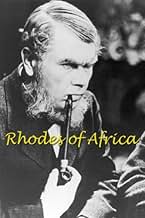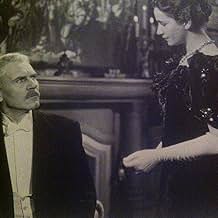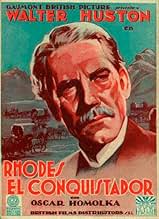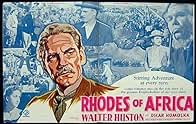This rousing adventure film tells the true story of Cecil Rhodes, a diamond miner who helped found the South African colonies.This rousing adventure film tells the true story of Cecil Rhodes, a diamond miner who helped found the South African colonies.This rousing adventure film tells the true story of Cecil Rhodes, a diamond miner who helped found the South African colonies.
- Awards
- 2 wins total
Ndanisa Kumalo
- King Lobengula
- (as Ndanisa Kumalo of Matabeleland)
Felix Aylmer
- Johannesburg Diplomat
- (uncredited)
Diana de Vaux
- Sara
- (uncredited)
Victor Fairley
- Official Announcing 'Diamond Rush'
- (uncredited)
Ernest Jay
- Minor Role
- (uncredited)
Allan Jeayes
- Kruger's Minister
- (uncredited)
Sam Livesey
- Johannesburg Diplomat
- (uncredited)
Glennis Lorimer
- Cartwright's Fiancee
- (uncredited)
Featured reviews
90 minutes is hardly long enough time to tell the story of a most complex man. Cecil Rhodes was a combination robber baron and adventurer who amassed a fortune by being the last man standing in a war to control the diamond mining industry in South Africa. But Rhodes was a guy who dreamed big and wanted nothing less than control of sub Sahara Africa and if he had lived another two decades he might have had it.
Walter Huston was imported from America to play Rhodes who never married. So single minded and intense was he in pursuit of his goals he didn't make time or wasn't interested in a family. If he had done that the immense fortune that he acquired would never have gone to Rhodes scholarships for instance.
Obviously Gaumont British films wanted him to be a hero, but there just was too much bad in what he did to create his fortune to make Huston as Rhodes a sympathetic figure. His great adversary Paul Kruger leader of the Transvaal Republic of the Boers played here by Oscar Homolka comes off as more sympathetic. By accident Gaumont British did what UFA Studios in Nazi Germany did on purpose in their film Ohm Kruger where the same story is told from the Boer and hence anti-British point of view.
With an independent and majority black led South Africa now, the Cecil Rhodes if filmed today would be markedly different. Probably a whole lot better as well.
Walter Huston was imported from America to play Rhodes who never married. So single minded and intense was he in pursuit of his goals he didn't make time or wasn't interested in a family. If he had done that the immense fortune that he acquired would never have gone to Rhodes scholarships for instance.
Obviously Gaumont British films wanted him to be a hero, but there just was too much bad in what he did to create his fortune to make Huston as Rhodes a sympathetic figure. His great adversary Paul Kruger leader of the Transvaal Republic of the Boers played here by Oscar Homolka comes off as more sympathetic. By accident Gaumont British did what UFA Studios in Nazi Germany did on purpose in their film Ohm Kruger where the same story is told from the Boer and hence anti-British point of view.
With an independent and majority black led South Africa now, the Cecil Rhodes if filmed today would be markedly different. Probably a whole lot better as well.
Cecil Rhodes was a terrible person who exploited Africa. Anyone with enough time should read up on his life. He double-crossed friends and foe alike. Many of these old films were like so much propaganda films for the white man mentality of stealing and swindling to get rich while making the person look like some kind of hero. I guess you could make a film about Hitler or Saddam Hussein in a favourable light also.Cecil Rhodes thought Africa should belong to White men. He believed it was the white man's destiny to rule the world.Actually most movies of this age and most now don't reflect reality. Just what the people want to believe. Watch any movie you see with a grain of salt.
CECIL RHODES played by Walter Houston in RHODES OF Africa (1936) is another of those odes too Empire. Most of these have to do with 'The British Empire' which "the Sun never sets on" and that includes this film. These films were very popular prior to World War II and every studio participated in making them. Though curious casting of a American actor for a then British hero. No doubt to give box office clout in the U.S.A. for this British made film.
Made at 'Shepherds Bush' the film purports to show CECIL RHODES career from his taking over of the diamond business, through empire building and too his death. His main opponent as shown is 'OHM' PAUL KRUGER played by Oskar Homolka, President of the South African Republic. Reading their histories neither would be too modern eyes likable or enlighten characters. Though in their era they had many admirers and wide spread popularity. It is best to read their histories then to depend upon this film for a informative view.
As 'Empire Films' go this a minor league entry. For a British film it has none of drive and spectacle that can be found in the films of Alexander KORDA. Movies like THE DRUM (1938) or THE FOUR FEATHERS (1939) are a far better watch. From the U.S.A. you should view Paramounts THE LIVES OF A BENGAL LANCER (1935), Warner Brothers THE CHARGE OF THE LIGHT BRIGADE (1936) or RKO's GUNGA DIN (1939). Even the minor league entry by Universal THE SUN NEVER SETS (1939) gives you better viewing value. The caveat is view these films for entertainment, for History go elsewhere.
Made at 'Shepherds Bush' the film purports to show CECIL RHODES career from his taking over of the diamond business, through empire building and too his death. His main opponent as shown is 'OHM' PAUL KRUGER played by Oskar Homolka, President of the South African Republic. Reading their histories neither would be too modern eyes likable or enlighten characters. Though in their era they had many admirers and wide spread popularity. It is best to read their histories then to depend upon this film for a informative view.
As 'Empire Films' go this a minor league entry. For a British film it has none of drive and spectacle that can be found in the films of Alexander KORDA. Movies like THE DRUM (1938) or THE FOUR FEATHERS (1939) are a far better watch. From the U.S.A. you should view Paramounts THE LIVES OF A BENGAL LANCER (1935), Warner Brothers THE CHARGE OF THE LIGHT BRIGADE (1936) or RKO's GUNGA DIN (1939). Even the minor league entry by Universal THE SUN NEVER SETS (1939) gives you better viewing value. The caveat is view these films for entertainment, for History go elsewhere.
Cecil Rhodes is NOT an easy guy to like here in the 21st century. While back in his day he was hailed as a hero, he was also the guy who started De Beers (the diamond monopoly) and was the poster boy for colonialism--having been the leader of Cape Colony (South Africa) and having started Rhodesia (now Zimbabwe)--two of the more racist nations at the time. He also had a huge part in orchestrating the bloody Boer War at the turn of the 19th century. So, it's not surprising that we don't see more biographies of the man--pro-colonialism films died out a long time ago.
This 1936 film is not especially good. First, it is dry as dust and often looks more like a documentary instead of a feature film--a very DRY documentary. Second, how good could such a biography be when they cast the VERY American Walter Huston in the lead?! Sure, he was a very fine actor...and totally wrong as the British Rhodes. Third, while the film SHOULD have been beautiful an expansive, it's obvious that the film was made in a studio--not the lovely South African countryside. And, the film lacks music that might have made the whole thing look and SOUND grand. Instead, it was just flat and dull.
By the way, Rhodes was, perhaps, the strongest supporter of colonialism in history and hoped to one day have Britain take control of Africa, the Middle East and even return the United States to its colonial empire! Now I would have loved to have heard this in the film!
This 1936 film is not especially good. First, it is dry as dust and often looks more like a documentary instead of a feature film--a very DRY documentary. Second, how good could such a biography be when they cast the VERY American Walter Huston in the lead?! Sure, he was a very fine actor...and totally wrong as the British Rhodes. Third, while the film SHOULD have been beautiful an expansive, it's obvious that the film was made in a studio--not the lovely South African countryside. And, the film lacks music that might have made the whole thing look and SOUND grand. Instead, it was just flat and dull.
By the way, Rhodes was, perhaps, the strongest supporter of colonialism in history and hoped to one day have Britain take control of Africa, the Middle East and even return the United States to its colonial empire! Now I would have loved to have heard this in the film!
In a boring drama about mining South Africa for all its natural resources, Walter Huston stars as the title character, the real life founder of many South African colonies. Sure, it's a typical role for the grand actor who excels in boisterous characters, but the movie is so boring, it could easily have been paired down. And since it's only seventy minutes, it probably already was paired down.
The start of the movie shows an ill Walter getting a death sentence if he doesn't take it easy and slow down. Of course he doesn't, and a title card comes up displaying "Ten Years Later". He's fit and healthy, and raring to go. Diamond mining, colonizing, farming, setting up towns, dealing with politicians-none of these things fall under the category of taking it easy, but Walter does all these things. As a result, Rhodesia was named after him, and the production was filmed there. Personally, I never find these types of movies very interesting, and not even Walter Huston could help me out.
The start of the movie shows an ill Walter getting a death sentence if he doesn't take it easy and slow down. Of course he doesn't, and a title card comes up displaying "Ten Years Later". He's fit and healthy, and raring to go. Diamond mining, colonizing, farming, setting up towns, dealing with politicians-none of these things fall under the category of taking it easy, but Walter does all these things. As a result, Rhodesia was named after him, and the production was filmed there. Personally, I never find these types of movies very interesting, and not even Walter Huston could help me out.
Did you know
- TriviaFinal film directed by Berthold Viertel.
- ConnectionsReferenced in Humour and Horror: Jonathan Rigby on Oscar Homolka (2024)
- SoundtracksCome Down and Open the Door
(uncredited)
Written by Slade Murray and A. Sutherd
Details
- Runtime
- 1h 30m(90 min)
- Color
- Sound mix
- Aspect ratio
- 1.37 : 1
Contribute to this page
Suggest an edit or add missing content

























